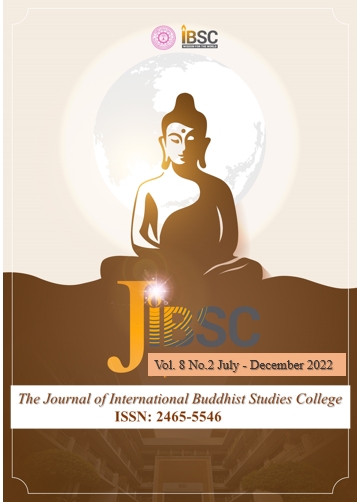Building a Peace Organization: A Case Study of The Peace Studies Program in International Buddhist Studies College
Main Article Content
Abstract
This qualitative and documentary research aims to explore the establishment and development of a peace organization within the Peace Studies Program at the International Buddhist Studies College (IBSC), Mahachulalongkornrajavidyalaya University (MCU). The study focuses on three main objectives: 1). to thoroughly examine the current state of the Peace Studies Program and its role as a peace organization; 2). to investigate the various roles and functions involved in the formation and operation of such an institution; 3). to explore the contributions of IBSC as a peace institution within the broader framework of MCU. This study employs qualitative research methods, gathering information from a diverse array of sources. Key informants, selected for their expertise in Peace Studies, were interviewed to provide valuable insights and perspectives. The strategic approach to enhancing the Peace Studies curriculum is deeply rooted in the teachings of Buddha’s Dharma, aiming to identify and implement the most effective conflict resolution methodologies. Participants in this initiative must possess a comprehensive skill set, including strong leadership, negotiation, communication, mediation, teamwork, conflict resolution, and reconciliation promotion abilities. Additionally, they should exhibit creativity and visionary foresight to effectively assess and mitigate potential risks. Emphasis is placed on fostering a sense of both individual and collective societal responsibility for the establishment and maintenance of peace. The study underscores the importance of fostering a sense of individual and collective responsibility for the establishment and maintenance of peace.
Article Details
The Journal of TCI is licensed under a Creative Commons Attribution-NonCommercial-NoDerivatives 4.0 International (CC BY-NC-ND 4.0) licence unless otherwise stated. Please read our Policies page for more information on Open Access, copyright and permissions.
References
Admission. on online. https://www.ibsc.mcu.ac.th/, (accessed on 14 February 2021)
Information. on online, http://www.un.org/en/documents/charter/preamble shtml, (accessed on 27 October 2021)
Barash, David P., and Charles P. Webel. Peace and conflict studies. Sage, 2013.
Concept of peace. http://www.uop.edu.pk/ocontents/concept (accessed on 20 August 2021)
Curriculum Doctor of Philosophy Program in Peace Studies (International Program) New Curriculum 2017.
Curriculum Doctor of Philosophy Program in Peace Studies (International Program) New Curriculum 2017:
Ebieri Favour, Amnesty. Basic Definition of Human Rights. Amnesty International. http://www.amnestyusa.org/research/human-rights-basics. (accessed on June 27 August 2021)
Galtung, J. “Violence, peace, and peace research”. Journal of Peace Research, Vol. 6 (No.3, 1969), 167-191.
Galtung, Johan. ‘Violence, Peace, and Peace Research, Essays on Peace: Paradigms for Global Order, ed.” Michael Salla, Walter Tonetto &Enrique and Martinez,(Central Queensland University press, 1995) (1995): 1.
General information. https://www.ibsc.mcu.ac.th/ (accessed on 14 February 2021)
Hernez‐Broome, Gina. “Social intelligence: the new science of human relationships.” (2012): 75-78.
Incerti-Théry, Irene. “Dialogue as a tool in peacebuilding. Theoretical and empirical perspectives.” Master’s thesis, UiT Norges arktiske universitet, 2016.
Information UNESCO. https://en.unesco.org/70years/building_peace. On online (accessed on 24th June 2021)
John Rawls, A Theory of Justice (revised ed, Oxford: Oxford University Press, 1999),
John Rawls. A Theory of Justice. (revised ed.), Oxford: Oxford University Press, 1999.
John Rawls. A Theory of Justice. Oxford: Oxford University Press., 1999.
Kabat-Zinn, J., & Hanh, T. N. (2009). Full catastrophe living: Using the wisdom of your body and mind to face stress, pain, and illness. Delta.
Keltner, Dacher. Born to be good: The science of a meaningful life. WW Norton & Company, 2009.
Kessen, Christine. “Living fully: Mindfulness practices for everyday life.” Mindfulness and social work. (2009): 31-44.
Kraft, Kenneth. “The wheel of engaged Buddhism: A new map of the path.” (1999).
Lederach, John P., and Fen O. Hampson. “Building peace: Sustainable reconciliation in divided societies.” International Journal. Vol. 53, No. 4 (1998): 799.
Nick Morgan. We Humans Are Social Beings - And Why That Matters For Speakersand Leaders. Forbes, https://www.forbes.com/sites/nickm organ/2015/09/01/we-humans-are-social-beings-and-why-that-matters for-speakers-andleaders/#68e0b05c6abd (accessed August 11, 2020).
Nickel, James. Human Rights‖ Stanford Encyclopedia of Philosophy. Stanford University, 2009.
Peace, dignity and equality on a healthy planet. https://www.un.org/en/ (accessed on 10 August 2021)
Phra Brahmagunabhorn (P.A. Payutto). Buddhadhamma Expanded Volume. Bangkok : Sahadhammik Press, 2016.
Vesilind, P. Aarne, ed. Peace engineering: when personal values and engineering careers converge. Lakeshore Press, 2014.
Webel, Charles, and Johan Galtung, eds. Handbook of peace and conflict studies. Vol. 7. London: Routledge, 2007.
Williams, Mark, and Danny Penman. Mindfulness: An eight-week plan for finding peace in a frantic world. Rodale, 2012.


